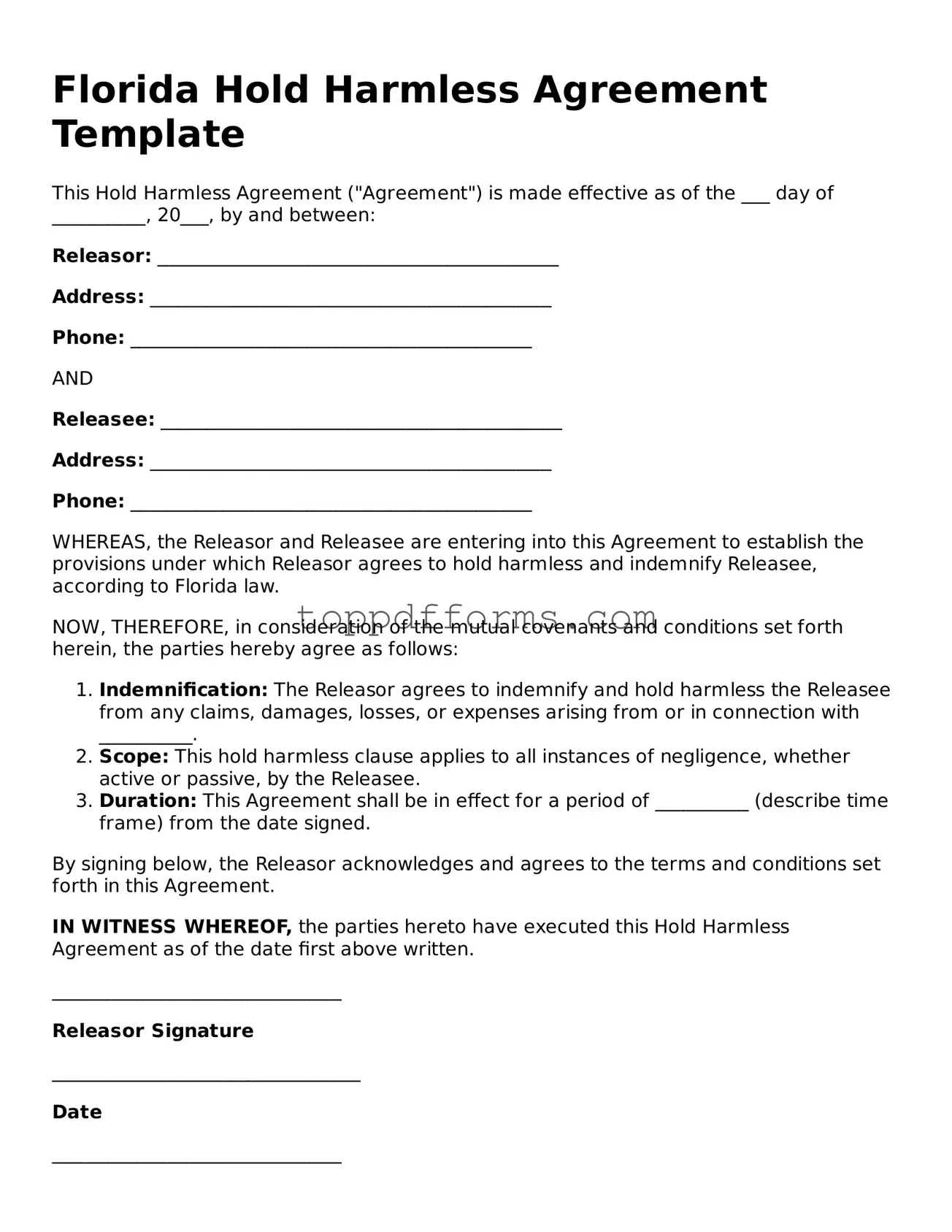Hold Harmless Agreement Document for Florida State
Things You Should Know About This Form
What is a Florida Hold Harmless Agreement?
A Florida Hold Harmless Agreement is a legal document that protects one party from liability for certain actions or events. In essence, it allows one party to agree not to hold the other party responsible for any damages or injuries that may occur. This type of agreement is commonly used in various situations, such as rental agreements, construction contracts, and event planning. The key purpose is to allocate risk between the parties involved, ensuring that one party bears the financial responsibility for potential claims or damages.
When should I use a Hold Harmless Agreement?
You should consider using a Hold Harmless Agreement in situations where there is a potential for injury or damage. For example, if you are hosting an event and allowing others to use your property, this agreement can protect you from liability if someone gets hurt. Similarly, contractors often use these agreements when working on a project to protect themselves from claims related to their work. Before signing any agreement, it is wise to assess the risks involved and determine if a Hold Harmless Agreement is appropriate for your circumstances.
What are the key components of a Hold Harmless Agreement?
A typical Hold Harmless Agreement includes several essential components. First, it identifies the parties involved, specifying who is being held harmless and who is assuming the risk. Second, it outlines the scope of the agreement, detailing the specific activities or situations covered. Third, it often includes a statement of indemnification, which explains that one party will compensate the other for any losses or damages incurred. Lastly, the agreement should be signed and dated by both parties to ensure its enforceability. Clarity in language is crucial to avoid misunderstandings later on.
Is a Hold Harmless Agreement enforceable in Florida?
Yes, a Hold Harmless Agreement can be enforceable in Florida, provided it meets certain legal standards. The agreement must be clear and unambiguous, outlining the responsibilities and liabilities of each party. Courts generally uphold these agreements unless they are deemed unconscionable or against public policy. It is important to note that certain types of liability, such as gross negligence or willful misconduct, may not be waivable. To ensure enforceability, it is advisable to consult with a legal professional when drafting or signing a Hold Harmless Agreement.
PDF Overview
| Fact Name | Description |
|---|---|
| Purpose | The Florida Hold Harmless Agreement is designed to protect one party from liability for certain actions or events. |
| Governing Law | This agreement is governed by Florida state law, specifically under Florida Statutes. |
| Parties Involved | Typically, two parties are involved: the indemnitor (the party providing protection) and the indemnitee (the party being protected). |
| Scope of Protection | The agreement may cover various liabilities, including personal injury, property damage, or other claims arising from specific activities. |
| Consideration | For the agreement to be enforceable, there must be consideration, meaning something of value exchanged between the parties. |
| Limitations | Certain limitations may apply, as the agreement cannot protect against gross negligence or willful misconduct. |
Common mistakes
Filling out a Florida Hold Harmless Agreement form can seem straightforward, but many individuals make common mistakes that can lead to confusion or legal issues. One significant mistake is failing to read the entire document carefully. This agreement outlines important responsibilities and liabilities. Skimming through the text can result in overlooking key clauses that may affect rights and obligations.
Another frequent error is not providing accurate information. When filling out personal details, such as names and addresses, it is crucial to ensure that everything is correct. Inaccuracies can lead to complications if the agreement needs to be enforced. Double-checking all entries can prevent misunderstandings later on.
People often neglect to include all necessary parties in the agreement. If multiple individuals or entities are involved, it is essential to list everyone who will be bound by the terms. Omitting a party can create gaps in liability coverage, leaving some individuals unprotected in case of an incident.
Additionally, many individuals forget to sign and date the form. A Hold Harmless Agreement is not valid without proper signatures. Both parties must acknowledge their understanding and acceptance of the terms. Failing to do so can render the agreement unenforceable.
Lastly, individuals sometimes overlook the importance of consulting with a legal professional. While it may seem unnecessary, seeking advice can provide clarity on specific clauses and implications. A lawyer can help ensure that the agreement is tailored to the unique circumstances of the situation, reducing the risk of future disputes.
Other Common State-specific Hold Harmless Agreement Forms
What Is a Hold Harmless Letter - Can be tailored to suit specific needs or situations, reflecting the unique circumstances of the interests involved.
What Is a Hold Harmless Agreement - It's critical to outline any exceptions to the hold harmless clause for clarity.
Hold Harmless Indemnity Agreement - Use this agreement as a foundation for responsible participation in activities with inherent risks.
The process of completing the USCIS I-864 form can be streamlined by utilizing resources that provide effective templates; for instance, you can find helpful guides at PDF Templates to ensure all necessary information is accurately filled in, thereby increasing the chances of a smooth sponsorship experience.
What Is a Hold Harmless Letter - It encourages greater participation in potentially risky events by managing liability expectations.
